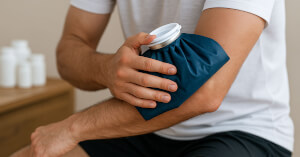
What Supplements Protect Your Knees, Shoulders, and Wrists?

Athletes place high demands on their joints: knees, shoulders and wrists take repeated loads, impacts and stresses that go beyond normal everyday activity.
When you run, jump, lift heavy weights or do a lot of overhead work, small micro-traumas accumulate in the cartilage, tendons and joint capsule. Without proper repair, this leads to inflammation, pain and sometimes early wear of the joint.
In addition, recovery time, nutrition, sleep and supplement support often don't keep pace with training intensity. That imbalance is what often triggers joint soreness in active people.
In this article we look at how targeted supplements may help protect your knees, shoulders and wrists, and then cover some important lifestyle and training adjustments you should follow too.
Sports That Put the Most Stress on Knees, Shoulders, and Wrists
Some sports naturally place higher mechanical stress on joints because of repeated impact, high load, or overhead motion. Knowing which ones can help you adapt your training and use supplements preventively, before pain appears.
- Running and Sprinting: repetitive impact that stresses the knees and ankles, especially on hard surfaces.
- Weightlifting and CrossFit: heavy compound movements that load the knees, shoulders, and wrists simultaneously.
- Tennis and Padel: quick directional changes and repetitive arm swings affecting shoulders and elbows.
- Table Tennis: high-speed forearm and wrist motions that can lead to wrist and elbow strain over time, and occasionally adhesive capsulitis of the shoulder (frozen shoulder).
- Swimming: intense shoulder rotation and repetitive extension that can cause overuse injuries.
- Basketball: jumping, landing, and twisting movements that pressure the knees and ankles.
- Cycling: continuous knee flexion and hip rotation that can cause patellar tracking issues.
- Gymnastics and Calisthenics: wrist hyperextension and shoulder strain from bodyweight holds and transitions.
- Boxing and Martial Arts: repetitive punching and striking motions stressing shoulders and wrists.
Being aware of these stress patterns helps athletes use supplements like collagen, MSM, and omega-3s more strategically, especially during intense training blocks or competitive seasons.
How Supplements Support Joint Health and Recovery
Supplements alone won't fix poor form, over-training or lack of recovery, but certain nutrients can support the joint tissues, reduce inflammation and improve repair mechanisms.
For example, some compounds help reduce inflammatory molecules, others supply building blocks for cartilage and tendon repair, or improve joint fluid (synovial fluid) viscosity so movement is smoother.
For athletes who stress their joints regularly, adding the right supplements can tip the balance from degradation toward regeneration. Let's review the most promising ones.
Top Supplements to Protect Your Joints
1. Collagen Peptides
Collagen is a structural protein found in tendons, cartilage and ligaments. When you ingest collagen peptides, you supply amino acids (like glycine, proline) that can support connective-tissue repair.
📊 Clinical Evidence: A randomized trial in 180 active men and women (18-30 yrs) with exercise-related knee pain showed that 5 g/day of specific collagen peptides for 12 weeks reduced activity-related knee pain significantly compared with placebo.
✔️ Typical Dosage Range: 5 g/day (as studied) up to 10-20 g/day for longer use.
Best for: athletes with frequent knee stress, tendon load, or who want a maintenance strategy for joints.
2. MSM
MSM is a sulfur-containing compound thought to help reduce inflammation and oxidative stress in joint tissues. For athletes, it's interesting because it may ease joint discomfort after heavy training.
📊 Clinical Evidence: A randomized controlled study in healthy men and women taking MSM found improved knee health and reduced joint pain at 12 weeks compared with placebo. Another pilot study in half-marathon runners showed MSM at 3 g/day for 3 weeks attenuated exercise-induced joint pain.
✔️ Typical Dosage Range: 1.5-3 g per day, preferably split into two doses (morning and evening) for better absorption and tolerance.
Best for: athletes experiencing post-training joint soreness, stiffness or looking for inflammation support.
3. Glucosamine
Glucosamine is one of the main structural components of cartilage. Supplementing with it may help maintain joint integrity and slow down wear caused by repetitive stress.
4. Chondroitin
Chondroitin works synergistically with glucosamine by helping cartilage retain water and elasticity. Taken together, they support cushioning and flexibility under heavy training loads.
📊 Clinical Evidence: Studies in soccer players and runners suggest that combining glucosamine (1.5-2 g/day) and chondroitin (800-1 200 mg/day) can reduce cartilage degradation markers and improve joint comfort over 12-16 weeks.
✔️ Typical Dosage Range: Glucosamine 1.5-2 g/day, Chondroitin 800-1 200 mg/day.
Best for: athletes doing high-impact training long-term, looking to protect cartilage integrity rather than treat active pain.
5. Curcumin
Curcumin, the active component in turmeric, works as a natural anti-inflammatory agent. For joints under repetitive stress, it may reduce inflammation and support comfort.
While large trials in athletes are less abundant, curcumin is increasingly used in sports nutrition for recovery and joint support.
✔️ Typical Dosage Range: 500-1 000 mg/day of standardized curcumin extract (often combined with black pepper extract for absorption).
Best for: athletes with chronic joint inflammation or tendon issues, or those who prefer more natural alternatives to NSAIDs.
5. Omega-3
Omega-3s help regulate inflammation, reduce joint stiffness and may support tissue recovery. For athletes with repetitive joint load (running, jumping, lifting) this is a solid "every-day" supplement.
✔️ Typical Dosage Range: 1-3 g/day of combined EPA + DHA (depending on diet and training load).
Best for: endurance athletes, heavy lifters, or anyone looking for foundational joint support plus cardiovascular and brain benefits.
6. Hyaluronic Acid
Hyaluronic acid is naturally present in joint fluid and helps maintain lubrication and smooth movement. For athletes, this can mean less mechanical friction and better joint resilience under load.
✔️ Typical Dosage Range: 120-240 mg/day (oral supplements) though research in athletes is still emerging.
Best for: athletes who feel joint "grinding" or stiffness, especially in knees or wrists after heavy use.
Stacking Strategy: Combining Supplements for Maximum Protection
Rather than relying on a single nutrient, combining several can create synergy. Here's how to think about stacking:
- Collagen + MSM : supports repair and inflammation reduction together.
- Glucosamine + Chondroitin : focused on cartilage support and long-term wear prevention.
- Curcumin + Omega-3 : potent anti-inflammatory duo for heavy training load.
Example: After a heavy training block, you might take collagen (5-10 g), MSM (2-3 g), along with your regular omega-3 dose. Then keep taking glucosamine and chondroitin daily as part of your long-term joint protection routine.
Remember: allow at least 8-12 weeks of consistent use to evaluate effects. Supplements take time. And always combine with good recovery, mobility work and proper technique.
Lifestyle & Training Habits That Protect Your Joints
- Warm up properly: dynamic movements that lubricate the joints, increase synovial fluid and prepare tendons.
- Prioritise technique: poor form is often the root cause of joint stress: knees tucking in during squats, shoulders overloaded in presses, wrists over-extended during bodyweight moves.
- Alternate impact: mix high-impact (sprints, plyos) with low-impact (swimming, cycling) to reduce cumulative joint load.
- Include mobility and flexibility work: 2-3 sessions per week focusing on hips, ankles, shoulders, wrists helps maintain range and reduce strain.
- Hydration & sleep: joint cartilage is mostly water. If you're dehydrated or underslept the repair processes slow down.
When to Seek Professional Help
If you experience persistent joint pain (more than 2 weeks), swelling, locking, significant loss of motion or pain that increases with rest rather than decreasing: then you should consult a sports physician, physical therapist or orthopaedic specialist.
Signs like audible clicking, joint giving way, or changes in joint shape may indicate structural issues (meniscus tear, labral injury, ligament damage) that supplements alone won't fix.
Key Takeaway
Joint pain doesn't have to be a normal part of athletic life. With the right supplements, smart training habits and recovery support, you can help protect your knees, shoulders and wrists season after season.
Focus on consistency, combine structural support (collagen, glucosamine/chondroitin) with anti-inflammatory strategies (MSM, curcumin, omega-3), and back it up with technique, mobility and recovery.
Get ahead of wear and tear rather than reacting to it, your joints will thank you.
FAQs
What are the best supplements to protect knees, shoulders, and wrists?
Top options include collagen peptides, MSM, glucosamine, chondroitin, curcumin, omega-3s, and hyaluronic acid. These nutrients support cartilage, reduce inflammation, and improve joint lubrication.
How long do joint supplements take to work?
Most joint supplements need consistent use for 8 to 12 weeks to show noticeable changes in comfort and mobility. Collagen and glucosamine stacks often require several months.
Should athletes take collagen before or after training?
Many athletes take 10 g of collagen 30 to 60 minutes before training with vitamin C for tendon support, or at any consistent time daily. Consistency matters more than exact timing.
Is MSM better taken in split doses?
Yes. Aim for 1.5 to 3 g per day split into two doses, morning and evening, to improve tolerance and maintain steadier levels.
Do glucosamine and chondroitin actually help athletes?
Evidence is mixed for pain, but many athletes use them for long-term cartilage support. They may help maintain cushioning during high-volume or high-impact training.
Curcumin vs. NSAIDs: which is better for joint pain?
Curcumin supports the body's anti-inflammatory pathways and is generally gentler on the stomach. NSAIDs act quickly but can have side effects. Ask your clinician which approach fits your case.
How much omega-3 should I take for joint support?
Common athletic ranges are 1 to 3 g per day of combined EPA + DHA. Take with meals to improve absorption and reduce fishy aftertaste.
Does oral hyaluronic acid work for joints?
Early research suggests oral HA may support joint lubrication and stiffness. Typical doses range from 120 to 240 mg per day.
Can I stack collagen, MSM, and omega-3 together?
Yes. Collagen supports connective tissue, MSM helps with inflammation and recovery, and omega-3s modulate stiffness. Many athletes combine them for complementary effects.
Who should avoid joint supplements?
People who are pregnant, nursing, or on medications such as blood thinners should consult a clinician first. Shellfish allergies may be an issue with some glucosamine products.
This article was originally published on Stackbb, your trusted source for science-based supplement guides.










